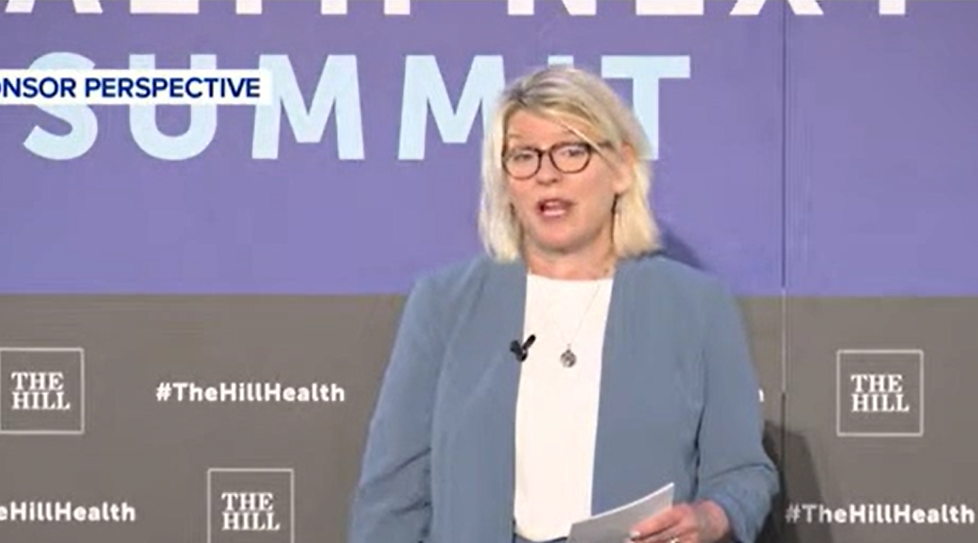We need policy to improve patient access to drugs and address middlemen who increase drug prices, according to participants in a March 27 healthcare conference organized by The Hill.
Sponsored by the Alliance for Aging Research and the National Pharmaceutical Council, The Health Next Summit featured discussion on a range of issues impacting healthcare access, including a lot of focus on abuses by pharmacy benefit managers (PBMs) and policy that can address those abuses.
“In the last couple of decades, we’ve seen increases in utilization management abuse by Medicare payers and PBM’s,” Sue Peschin of the Alliance for Aging Research (pictured) told the gathering. “This is also showing up in the narrowing of prescription drug formularies, more requirements for prior authorization and step therapy, and even attempts at differential pricing schemes.”
Narrow formularies mean PBMs limit the drugs that will be covered by insurers, prior authorization is when PBMs must approve doctors’ prescriptions—and step therapy is when patients are forced to try cheaper alternatives to their prescription, proving those alternatives fail to work before they’re allowed to take the drugs their doctor recommended.
All of these “utilization management” practices can harm patients, but they provide profits for PBMs, middlemen who use their market power to raise drug prices and reduce access.
PBMs “have been enabled by the Centers for Medicare and Medicaid Services’ lack of guardrails, but this can be fixed, and this is what we work on on a regular basis,” said Peschin.
‘Passionate’ Congress member
U.S. Rep. Earl “Buddy” Carter (R-GA) is also working on the issue. In an address to the summit, he described himself as “passionate about PBM reform.”
Rep. Carter noted that his House Energy & Commerce Committee and the entire House passed the “Lower Costs, More Transparency Act” to reform PBMs last year. “It had Republican and Democratic support. And I think that was significant,” Carrer said. “I would submit to you that when it comes to PBM reform, we have some Democrats who are as passionate as Republicans.“
At the end of the last Congress, proposed PBM reforms were added to a December spending bill but ultimately removed. Rep. Carter maintained that those ideas would be revived for inclusion in a spending package this spring.
“We have a commitment from the Speaker that those will be put into the reconciliation bill. They will save us some money,” said Rep. Carter.
Although the reconciliation bill would be focused on spending and saving, Carter said the legislation he had in mind would be about more than just budgeting. “This will be an opportunity for us to get true PBM reform,” he said.
A major concern with PBMs is their ability to control prices and steer prescriptions to their own pharmacies due to their market power—with more than 80% of all U.S. prescriptions handled by the top three PBMs.
“Right now what we have is vertical integration where the insurance company owns the PBM that owns the group purchasing organization that owns the pharmacy that owns the doctor. And we’ve got to bust that up,” Rep. Carter said.
“We need reform to the prior approval process. We need to streamline that, make it quicker and more efficient so that patients don’t have to wait on their drugs,” he added. “We need to make sure that when a particular drug is ordered, that that patient can get that drug.”
The Federal Trade Commission has been conducting an investigation about PBM abuses since 2022, and they issued interim reports in July and January. Carter said the final report should be released soon.
‘Perverse incentives’
PBMs and other challenges facing the biopharma industry were highlighted in a presentation from John M. O’Brien, President & CEO of the National Pharmaceutical Council.
“Today there are millions of people who are benefiting from medicines that they didn’t think they would ever see to treat the diseases that they’re living with, but unfortunately we live in a system that’s rife with perverse incentives. O’Brien said.
“There are parts of our healthcare system that seek to extract margin out of drug spending as opposed to using medicines to help people get better,” he added. “And many of the policies that we have today or are considering today in Washington may actually make this worse.”
Rather than cutting into drug spending, we need to figure out how to remunerate drug makers to sustain continued innovation, according to O’Brien.
“We need as much innovation in how we pay for drugs as we do bringing new medicines to life. and I think ultimately patients are waiting for that,” he said.




